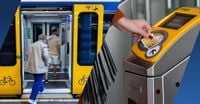In a move aimed at making public transport more accessible for low-income individuals, the Dutch cabinet is investigating the introduction of a national travel pass that would allow people to travel for free or at a reduced rate during off-peak hours. This initiative, announced on April 28, 2025, by Minister Barry Madlener and State Secretary Chris Jansen (both members of the PVV party), is intended to enhance the mobility of those living on social assistance and improve their ability to participate in society.
The proposed pass would provide access to various modes of public transport, including trains, buses, trams, and metros, benefiting approximately 500,000 households currently living at or below the social assistance level, with an additional 400,000 households just above that threshold. This substantial demographic could see a significant improvement in their daily lives, as the pass would facilitate easier access to essential services, such as healthcare, and allow individuals to visit family and friends more freely.
To fund this initiative, the cabinet plans to allocate 157.5 million euros from the Climate Fund and seek another 152.5 million euros from a European social climate fund aimed at combating poverty related to energy and transport. Additionally, local authorities are in discussions about contributing to the funding of this travel pass, dubbed the "Onderwegpas OV."
However, the proposal has faced scrutiny, particularly from the umbrella organization OV-NL, which represents public transport operators in the Netherlands. Hatte van der Woude, the chair of OV-NL, expressed concerns that while the travel pass is a commendable idea, it does not address the larger issues plaguing the public transport sector. "The plan is a good idea, and the public transport sector has been advocating for it, but it doesn’t solve the bigger problems," she stated. Van der Woude highlighted that simultaneous budget cuts of 335 million euros annually from public transport funding are exacerbating the situation, leading to fewer services and higher costs for existing passengers.
As ticket prices for buses and trams are projected to increase by 15 to 20 percent starting in 2026, the need for affordable travel options is becoming increasingly urgent. The cabinet's cuts are expected to drive up prices for all passengers, making the public transport system less accessible overall. Van der Woude noted that over the past few years, the number of public transport users has declined, with 10 percent of lines and stops disappearing, making it harder for individuals to rely on these services.
In their letter to the Tweede Kamer, Madlener and Jansen emphasized the importance of this travel pass in enhancing the quality of life for low-income families. They stated, "This enables people with limited resources to participate in society, visit friends and family, and reach necessary facilities such as hospitals." The cabinet's initiative is being framed as a critical step toward ensuring that public transport does not become a luxury that only a few can afford.
Despite the positive intentions behind the travel pass, concerns remain about its feasibility and the financial implications for public transport providers. Van der Woude pointed out that without additional investments, the quality of public transport could deteriorate further. "The costs are rising, and revenues are falling," she noted, urging the cabinet to reconsider its cuts to public transport funding.
The proposed travel pass comes at a time when many are questioning the sustainability of the public transport system in the Netherlands. As costs continue to rise and the number of users declines, the challenge for the government will be to balance the needs of low-income individuals with the financial realities of maintaining a robust public transport network.
In conclusion, while the Onderwegpas OV has the potential to greatly benefit low-income families by providing more affordable travel options, it also raises significant questions about the future of public transport funding in the Netherlands. The cabinet's plan to investigate this initiative reflects an awareness of the pressing need for accessible public transport, but whether it can be successfully implemented without exacerbating existing issues in the sector remains to be seen.




